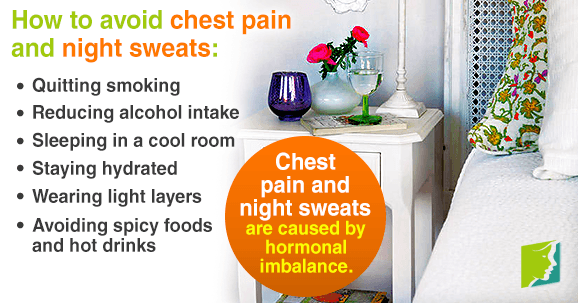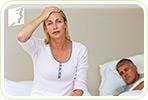During menopause, many women are bothered by the unpleasant and uncomfortable side effects of this transitional period. Night sweats, for example, can disrupt sleep patterns and daily life. Equally, chest pains - a less common symptom of menopause - can be incredibly disconcerting. While the symptoms are often separate manifestations, they can sometimes be related, as night sweats can lead to increased heart rate and palpitations. That said, chest pain should be investigated by a medical professional to rule out the possibility of a more serious condition.
About Night Sweats
Sometimes called cold sweats, these night time episodes involve a sudden flush of heat and period of sweating, often following by sudden chills or a feeling of coldness. These symptoms often appear to be unrelated to the surrounding air temperature or circumstances. Consequently, night sweats can be extremely upsetting for women, as they can be very disturbing to sleeping patterns and emotional well-being. When night sweats are accompanied by other symptoms, such as chest pain, there is an even greater chance of distress, as this symptom can be very difficult to deal with.
What Causes Chest Pain and Night Sweats?
Like most symptoms of menopause, the main cause behind night sweats and chest pain in menopausal women is an imbalance of the female sex hormones, estrogen and progesterone. Night sweats and hot flashes occur because estrogen levels are connected with the hypothalamus, which is the part of the brain that regulates body temperature. When there is an imbalance of estrogen levels in the body, the hypothalamus may send incorrect signals to the rest of the body, which can lead to a rush of blood to the face and neck and the resulting heat this produces. Chest pains, if they are related to this reaction, are part of the body's response of elevated heart rate and accelerated breathing.
How to Prevent and Manage Night Sweats
To avoid night sweats or at least mitigate the effects of these unpleasant episodes, women can make small lifestyle changes, such as:
- Quitting smoking
- Reducing alcohol intake
- Sleeping in a cool room, perhaps with a fan next to the bed
- Staying hydrated
- Wearing light layers
- Avoiding spicy foods and hot drinks
If after making these changes, women find that they are still troubled by night sweats and chest pain, there are other options that can be considered. Natural remedies or alternative treatments are popular options for women who are not ready to look into the more invasive pharmaceutical treatments.
There are a number of herbal supplements on the market that can help with chest pain and night sweats, such as:
- Black cohosh
- Soy
- Ginseng
- Sage
- Licorice
Recommendation
If women experience continuous or severe chest pain and night sweats, then it is recommended that they visit their doctors. Treatment options are varied, but the most likely suggestion will be hormone replacement therapy (HRT), as this is the most commonly prescribed medication for multiple menopausal symptoms. Click here for more information about treating night sweats.
Sources
- The National Institute of Health. "Signs of the Menopausal Transition" www.nih.gov
- Boston Women's Health Collective. "Hot Flashes, Night Sweats and Sleep Disturbances". Our Bodies, Ourselves, 2006.
- Von Muhlen, DG, et al. "A community-based study of menopause symptoms and estrogen replacement in older women". Maturitas. Sept 1995; 22(2):71-8.


